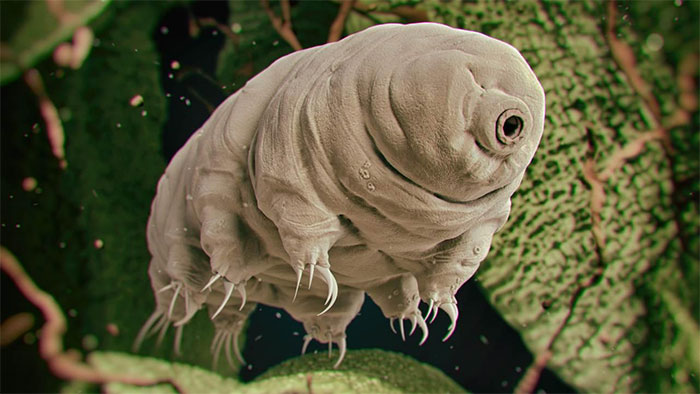The protein that makes water bears immortal
US scientists discovered that the Dsup protein found only in water bears protects their cells from external damage like radiation.
A team from the University of California, San Diego, discovered the mechanism of action of the protein found in water bears, or tardigrade, which helps protect them in extreme conditions, according to results published in eLife.

Water bears are said to be the toughest living things on the planet.(Photo: Newsweek).
In the latest study, UC San Diego scientists want to understand some of the biological mechanisms behind water bears' exceptional ability to survive. Previously, other researchers identified a protein unique to water bears called Dsup (protein that limits damage) that helps the animal fight off dangerous X-rays. However, they do not know exactly how the Dsup protein protects them from radiation.
To answer the question, the UC San Diego team used biochemical analysis and found that Dsup binds to chromatin, a substance containing DNA and and proteins in chromosomes inside the cell. The bond creates a "protective cloud" that shields the cell from the destructive effects of strong molecules such as hydroxyl radicals generated when exposed to X-rays.
The discovery not only enhances the understanding of the biology of water bears but also helps scientists develop animal cells that survive longer under extreme conditions."In theory, we could design an optimized version of Dsup to protect DNA in many different cell types," said James Kadonaga, a professor of biology at UC San Diego, who co-authored the study. said.
About 0.1 - 1mm long, tiny water bears live in nearly every water environment around the world, including the deep sea and the Arctic. With sustained vitality, they are considered to thrive in extreme conditions. They survive even when exposed to extreme radiation or record low temperatures.
- The shape of the newly discovered water bear in Japan
- Video: See the vertical nose of the only "immortal" creature on Earth
- Video: See the horizontal vertical surface of the unique 'immortal' creature on Earth
- Transplanting proteins from the 'longevity' creature into human cells, surprised by the results
- The mystery behind the only 'immortal' creature on Earth
- Animals that are capable of being
- Scientists have just shown how the 'immortal' creature on Earth goes
- Strange gene of the only animal that survives in the universe
- Interesting facts about little-known bears
- Mysterious immortal creatures, young and old
- 8 ways to become immortal in ancient myths
- 10 great plant protein sources to replace animal protein
- The shape of the newly discovered water bear in Japan
- Breeding bear bears: The situation of raising bears is significantly reduced
 Animal 'suffering' after hibernation
Animal 'suffering' after hibernation Why do goats climb well?
Why do goats climb well? Scientists were surprised to see chimpanzees eating turtles
Scientists were surprised to see chimpanzees eating turtles Giant catfish died deadly due to drought in Thailand
Giant catfish died deadly due to drought in Thailand How do marine animals drink filtered water?
How do marine animals drink filtered water?  Discover the secret of the water buffalo
Discover the secret of the water buffalo  Shocking discovery about the Earth's 'tail'
Shocking discovery about the Earth's 'tail'  Top 10 Unbelievable Ways Animals Survive in Dangerous Environments
Top 10 Unbelievable Ways Animals Survive in Dangerous Environments  Mysterious wonders of the world
Mysterious wonders of the world  The largest animals that lived in the desert, still exist today
The largest animals that lived in the desert, still exist today 